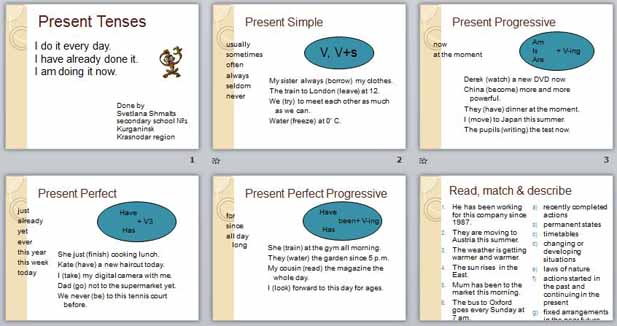
Present Tenses
I do it every day.
I have already done it.
I am doing it now.
Done by
Svetlana Shmalts
secondary school №1
Kurganinsk
Krasnodar region

Present Simple
V, V+s
usually
sometimes
often
always
seldom
never
My sister always (borrow) my clothes.
The train to London (leave) at 12.
We (try) to meet each other as much as we can.
Water (freeze) at 0’ C.

Present Progressive
Am
Is + V-ing
Are
now
at the moment
Derek (watch) a new DVD now.
China (become) more and more powerful.
They (have) dinner at the moment.
I (move) to Japan this summer.
The pupils (writing) the test now.

Present Perfect
Have
+ V3
Has
just
already
yet
ever
this year
this week
today
She just (finish) cooking lunch.
Kate (have) a new haircut today.
I (take) my digital camera with me.
Dad (go) not to the supermarket yet.
We never (be) to this tennis court before.

Present Perfect Progressive
Have
been+ V-ing
Has
for
since
all day long
She (train) at the gym all morning.
They (water) the garden since 5 p.m.
My cousin (read) the magazine the whole day.
I (look) forward to this day for ages.

Read, match & describe
- He has been working for this company since 1987.
- They are moving to Austria this summer.
- The weather is getting warmer and warmer.
- The sun rises in the East.
- Mum has been to the market this morning.
- The bus to Oxford goes every Sunday at 7 am.
- I go to school on foot.
- recently completed actions
- permanent states
- timetables
- changing or developing situations
- laws of nature
- actions started in the past and continuing in the present
- fixed arrangements in the near future

Add –s or –es to the verbs where necessary
He usually visit __his grandparents at weekends.
They go__ on holiday in summer.
My sister hate__ hanging out in the mall.
The film finish__ at 10 p.m.
Everybody look__ smart at the party.
James and I get__ along very well.
Sue always get__ on my nerves. She’s annoying.
No one like__ our new classmate.
s
s
es
s
s
s

Choose the correct auxiliary verb HAVE or HAS
- I … been to the cinema this week.
- She … eaten the cake.
- Mike … wasted all his money.
- They … made the sandwiches for the picnic.
- The boy … hurt his hand.
- My mother … paid the household bills today.
- The children … alresy seen the film.

Thank you for your attention
Good luck!


 Получите свидетельство
Получите свидетельство Вход
Вход





















 Презентация по английскому языку "Present Tenses" (0.69 MB)
Презентация по английскому языку "Present Tenses" (0.69 MB)
 0
0 2134
2134 411
411 Нравится
0
Нравится
0


